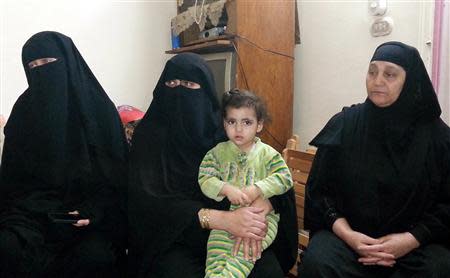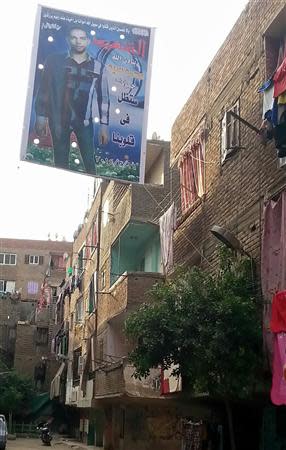In Cairo, one family's story shows rise of radical threat
By Tom Perry CAIRO (Reuters) - Fahmy Abdel Raouf and his 13-year old son had been missing for months when their family got word they had been killed in a gun battle with security forces and hailed as "martyrs" by the most dangerous militant group in Egypt. "If his intention was jihad, I hope God accepts his deed," said Abdel Raouf's wife, dressed head-to-toe in black with only her eyes visible behind a conservative Islamic face veil as she spoke at their family home in Cairo. The story of the father and son from a working class neighborhood of Cairo offers a glimpse into the militant threat facing Egypt, which has increased dramatically since the army overthrew Muslim Brotherhood President Mohamed Mursi last year. The pair were members of the group spearheading Islamist attacks in Egypt, Ansar Bayt al-Maqdis, according to both the authorities and a statement from the organization. Abdel Raouf, 38, had fought alongside Islamists in the Syrian civil war. His son, radicalized by the state's bloody crackdown on Islamists that followed Mursi's overthrow last year, was a much newer convert. They symbolize the growing complexity of a problem that will face Abdel Fattah al-Sisi, the former army chief who became Egypt's de facto leader when he deposed Mursi. Sisi is expected to win a presidential election in May. Armed groups are drawing in both established militants, such as Abdel Raouf, and the recently radicalized, such as his son. Their reach has extended well beyond the Sinai Peninsula - birthplace of Ansar Bayt al-Maqdis - to the capital. At least four members of the cell targeted on March 19 came from the same Cairo neighborhood. "You are not talking about long-standing or known organizations," said Khalil al-Anani, an expert on Islamist movements at Johns Hopkins University in the United States. "We are talking about the third generation of radical jihadists that emerged from the Arab Spring," he said. "This is a generation that nobody has control over." FROM HIGH SCHOOL STUDENT TO "MARTYR" Abdel Raouf and his son died on March 19 when the security forces stormed their bomb-making factory in Qalyoubia province, just north of Cairo, killing a total of six militants. Two army officers also died in the five-hour long operation. The authorities say it was a major blow to Ansar Bayt al-Maqdis, the group behind some of the biggest attacks of the last nine months, including a failed attempt to kill the interior minister and large bomb attacks on police stations. Ansar Bayt al-Maqdis, or Supporters of Jerusalem, issued a statement naming the "martyrs" killed that day. They included Abdel Raouf, an oil industry technician, and his son, the similarly named Abdel Raouf Fahmy Abdel Raouf. The boy had vanished in January after sitting his end-of-term exams. "I was surprised and shocked," said the wife and mother, a woman in her thirties who declined to give her full name during an interview at the modest family home in the al-Matariya district of northeast Cairo. She heard of their deaths on TV. Both the authorities and Ansar Bayt al-Maqdis said the elder Abdel Raouf had fought in Syria, along with another member of his cell from the same Cairo neighborhood in the city's northeast. According to officials, Abdel Raouf had also undergone training in the Gaza Strip. His role in Ansar Bayt al-Maqdis had included reconnoitering police facilities, they said, speaking on condition of anonymity because they were not permitted to talk to the media. His wife described her husband as a God-fearing man who spoke little of politics and travelled a lot for work. Asked about his links to the Syrian war and Ansar Bayt al-Maqdis, she challenged the government to prove his involvement, although she did not deny the claims. She had taken note of the Ansar Bayt al-Maqdis statement announcing the deaths, memorizing a reference to her son as "a cub of that lion who had insisted on waging holy struggle with his father". One of her three surviving children, an infant daughter, sat beside her as she candidly set out her view of events. "The war is a war on religion," she said. The police had been hunting her husband for months. When Abdel Raouf's wife and sister visited his mother in hospital in February, security agents forced them to remove their face veils in case he had come in disguise, they said. "HE NEVER LIKED" THE BROTHERHOOD Abdel Raouf appeared to have been on the police radar for years. He was tortured in deposed autocrat Hosni Mubarak's era, his family said. His mother recalled a time he returned home unable to hold a cup of tea. He said his tormentors had shocked him with electrodes on his tongue. After Mubarak was toppled by a popular uprising in 2011 and the Islamist Mursi elected the following year, the police left Abdel Raouf alone. But he found no satisfaction in Muslim Brotherhood rule. He viewed the mainstream group as too soft on Islam and said they were promoting "half religion". "He never liked them," his wife said. When the military removed Mursi after a year in office following mass protests against his rule, Abdel Raouf told his family to avoid protest camps set up by Brotherhood supporters demanding his reinstatement, his family said. Nevertheless, one of Abdel Raouf's brothers was among the hundreds of people killed on August 14 when security forces used overwhelming force to destroy those camps. The authorities say Abdel Raouf's brother was shot in clashes with the security forces that day. His family say he was killed while collecting his family from across town. It was after burying his brother two days later that Abdel Raouf disappeared. His wife recalled his last words as: "God will give the people the ruler they deserve." The day of his brother's funeral, August 16, saw violent mass protests in which a further 120 people were killed, including two police officers. The authorities say Abdel Raouf participated in attacks on the security forces. His family says he wasn't there. It was also a turning point for Abdel Raouf's son. After his uncle's death, the 13-year old began taking part in protests against the government for the first time. "He would say: 'This is utter injustice,'" his mother said. Locals tell a similar story about another of the militants from Matariya killed on March 19. Outside the house where he lived, a banner honors him as "the martyr" Mohamed Sayid. Neighbors say he too became radicalized in the demonstrations that followed the storming of the camps, having never before shown signs of extremism or political affiliations. "He was just like us. He'd go to weddings, smoke cigarettes and was not religious or anything like that," said one youth, part of a group standing nearby. Another, referring to Ramses Square where the August 16 protests took place, said: "What caused all of this was that he went out in the protest at the time of Ramses. One of his friends died, and that was that." "LOOSE COORDINATION" Ansar Bayt al-Maqdis emerged in North Sinai in 2011, taking root in the security vacuum that emerged after Mubarak's downfall. Its initial target was Israel. The group blew up a pipeline for exporting gas to Israel and fired rockets at the southern Israeli resort of Eilat. But since last summer, its focus has switched to the Egyptian state. The group has claimed responsibility for attacks that have contributed to a death toll of more than 500, mostly police and soldiers. In January, it shot down an army helicopter in Sinai, where the military is trying to crush the militants. "It looks to a great extent like individual cells crop up and there may be some very loose coordination with other elements of 'the organization', or communication with figures outside - whether, it's al Qaeda, or some of the extremist organizations in Libya, for example," said a Western diplomat. The United States has designated Ansar Bayt al-Maqdis a terrorist group, citing attacks including one that killed three South Korean tourists in Sinai in February. Egypt also accuses the Brotherhood of a role in the violence and declared it a terrorist group after a suicide attack on a police station claimed by Ansar Bayt al-Maqdis. However, Western countries say they are unconvinced by Cairo's assertions that the mainstream Brotherhood is tied to the militants. "We continue to see no data supporting the claim of organizational links between ABM and the Muslim Brotherhood," said the diplomat, using an acronym for Ansar Bayt al-Maqdis. The Brotherhood, Egypt's biggest party until last summer, has denounced the violence. But by banning the Brotherhood, the government risks pushing more people deeper underground and into the arms of those who embrace the shedding of blood. Anani of Johns Hopkins University said: "Ansar Bayt al-Maqdis has growing appeal among disenchanted Islamists." "It is not easy to chase these young radicals." (Writing by Tom Perry; Editing by Michael Georgy and Peter Graff)



